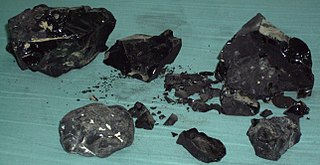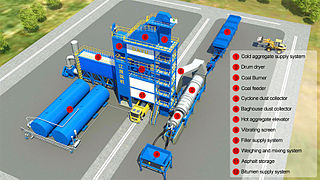
Bitumen is a sticky, black, highly viscous liquid or semi-solid form of petroleum. In the U.S., it is commonly referred to as asphalt. It may be found in natural deposits or may be a refined product, and is classed as a pitch. Before the 20th century, the term asphaltum was also used. The word is derived from the Ancient Greek ἄσφαλτος ásphaltos. The largest natural deposit of bitumen in the world, estimated to contain 10 million tons, is the Pitch Lake in southwest Trinidad.

Road transport or road transportation is a type of transport using roads. Transport on roads can be roughly grouped into the transportation of goods and transportation of people. In many countries licensing requirements and safety regulations ensure a separation of the two industries. Movement along roads may be by bike, automobile, bus, truck, or by animal such as horse or oxen. Standard networks of roads were adopted by Romans, Persians, Aztec, and other early empires, and may be regarded as a feature of empires. Cargo may be transported by trucking companies, while passengers may be transported via mass transit. Commonly defined features of modern roads include defined lanes and signage. Various classes of road exist, from two-lane local roads with at-grade intersections to controlled-access highways with all cross traffic grade-separated.
Tarmacadam is a road surfacing material made by combining crushed stone, sand, and tar, patented by Welsh inventor Edgar Purnell Hooley in 1902. It is a more durable and dust-free enhancement of simple compacted stone macadam surfaces invented by Scottish engineer John Loudon McAdam in the early 19th century. The terms "tarmacadam" and tarmac are also used for a variety of other materials, including tar-grouted macadam, bituminous surface treatments and modern asphalt concrete.

John Loudon McAdam was a Scottish civil engineer and road-builder. He invented a new process, "macadamisation", for building roads with a smooth hard surface, using controlled materials of mixed particle size and predetermined structure, that would be more durable and less muddy than soil-based tracks.

A road surface, or pavement, is the durable surface material laid down on an area intended to sustain vehicular or foot traffic, such as a road or walkway. In the past, gravel road surfaces, macadam, hoggin, cobblestone and granite setts were extensively used, but these have mostly been replaced by asphalt or concrete laid on a compacted base course. Asphalt mixtures have been used in pavement construction since the beginning of the 20th century and are of two types: metalled (hard-surfaced) and unmetalled roads. Metalled roadways are made to sustain vehicular load and so are usually made on frequently used roads. Unmetalled roads, also known as gravel roads, are rough and can sustain less weight. Road surfaces are frequently marked to guide traffic.

Asphalt concrete is a composite material commonly used to surface roads, parking lots, airports, and the core of embankment dams. Asphalt mixtures have been used in pavement construction since the beginning of the twentieth century. It consists of mineral aggregate bound together with bitumen, laid in layers, and compacted. The process was refined and enhanced by Belgian-American inventor Edward De Smedt.

Macadam is a type of road construction pioneered by Scottish engineer John Loudon McAdam around 1820, in which crushed stone is placed in shallow, convex layers and compacted thoroughly. A binding layer of stone dust may form; it may also, after rolling, be covered with a cement or bituminous binder to keep dust and stones together. The method simplified what had been considered state-of-the-art at that point.

Cobblestone is a natural building material based on cobble-sized stones, and is used for pavement roads, streets, and buildings.

A steamroller is a form of road roller – a type of heavy construction machinery used for leveling surfaces, such as roads or airfields – that is powered by a steam engine. The leveling/flattening action is achieved through a combination of the size and weight of the vehicle and the rolls: the smooth wheels and the large cylinder or drum fitted in place of treaded road wheels.
Pavement, in construction, is an outdoor floor or superficial surface covering. Paving materials include asphalt, concrete, stones such as flagstone, cobblestone, and setts, artificial stone, bricks, tiles, and sometimes wood. In landscape architecture, pavements are part of the hardscape and are used on sidewalks, road surfaces, patios, courtyards, etc.

Two-Lane Blacktop is a 1971 American road movie directed by Monte Hellman, written by Rudy Wurlitzer and starring songwriter James Taylor, the Beach Boys drummer Dennis Wilson, Warren Oates, and Laurie Bird.

A road roller is a compactor-type engineering vehicle used to compact soil, gravel, concrete, or asphalt in the construction of roads and foundations. Similar rollers are used also at landfills or in agriculture.

Chipseal is a pavement surface treatment that combines one or more layer(s) of asphalt with one or more layer(s) of fine aggregate. In the United States, chipseals are typically used on rural roads carrying lower traffic volumes, and the process is often referred to as asphaltic surface treatment. This type of surface has a variety of other names including tar-seal or tarseal, tar and chip, sprayed seal or surface dressing.
McAdam or MacAdam may refer to:

An asphalt plant is a plant used for the manufacture of asphalt, macadam and other forms of coated roadstone, sometimes collectively known as blacktop or asphalt concrete.
The history of road transport started with the development of tracks by humans and their beasts of burden.
Asphalt most often refers to:

A hardstand is a paved or hard-surfaced area on which vehicles, such as cars or aircraft, may be parked. The term may also be used informally to refer to an area of compacted hard surface such as macadam.












